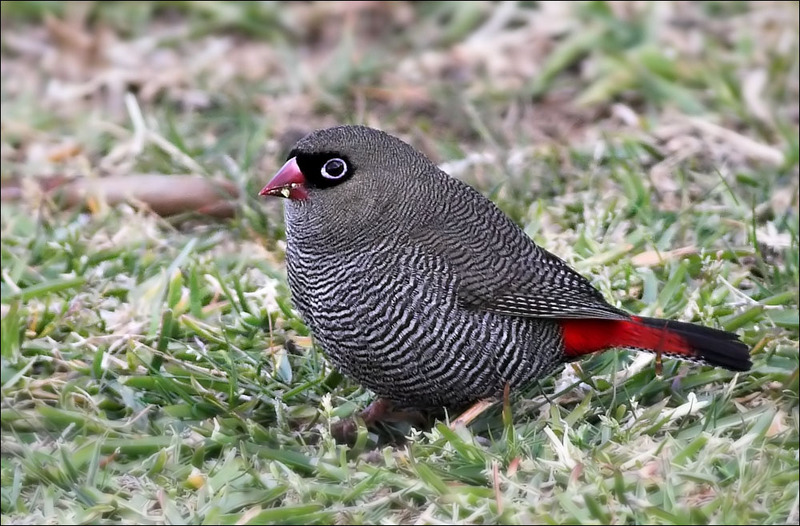|
| Query: Small heath | Result: 16th of 32 | |
Beautiful Firetail (Stagonopleura bella) - Wiki
| Subject: | Beautiful Firetail (Stagonopleura bella) - Wiki
| |

| Resolution: 1000x658
File Size: 223232 Bytes
Date: 2007:10:09 17:28:23
Camera: Canon EOS 20D (Canon)
F number: f/7.1
Exposure: 1/200 sec
Focal Length: 400/1
Upload Date: 2008:01:16 17:04:47
|
Beautiful Firetail
From Wikipedia, the free encyclopedia
Order: Passeriformes
Family: Estrildidae
[Photo] Beautiful Firetail (Stagonopleura bella), NSW, Australia. "Plain looking from any distance, the barring is only evident at close quarters. These guys ventured in and out of the adjacent heath to feed on the grass seeds amongst the lawn mown by the wallabies. Every time you moved a muscle they'd be back in the heath/scrub in a blink and a buzz of wings." Source: Flickr (www.flickr.com/photos/ozjulian/1573541146/). Date: Taken on October 9, 2007. Author: aaardvaark (www.flickr.com/photos/ozjulian/).
The Beautiful Firetail (Stagonopleura bella) is a common species of estrildid finch found in Australia. It has an estimated global extent of occurrence of 1,000,000 km². The species inhabits temperate shrubland habitats in Australia. The status of the species is evaluated as Least Concern.
Description
At 10 to 13 cm (4 to 5 in) long and weighing 14 g (½ oz) the Beautiful Firetail is a small plump bird, slightly smaller than the Diamond Firetail. Its plumage is mostly olive-brown. The white chest has a fine pattern of dark lines. The head has a black mask with pale blue rings around the eyes and a thick red beak. Its rump is a deep red, its legs and feet are creamy pink. The wings and tail are short and rounded. Juvenile birds are less colourful with a smaller face mask and a blackish beak.
Distribution and Habitat
The Beautiful Firetail is endemic in Southeastern Australia. Its distribution range extends from Newcastle to Kangaroo Island, however, the bird is most prolific in Tasmania and off-shore islands. It lives in coastal heathland, forests and shrubbery, never far from water.
The Beautiful Firetail is considered a resident bird, keeping close to home.
Behaviour
The Beautiful Firetail mainly feeds on grass seed and Casuarina and Melaleuca seeds. It can also be found in association with Banksia ericifolia heathland in coastal New South Wales. Small insects and snails occassionaly complement this herbivore diet. The birds are usually found in pairs or forming small groups of up to 20 individuals.
Reproduction
In the breeding season lasting from October to January the Beautiful Firetail nests in dense foliage near the ground. The nest is made of grass and thin twigs, its insides are covered in feathers. It is bottle-shaped with a long tunnel-like entrance on one side leading to a spherical nesting chamber.
Both parents build the nest together, brood the five to eight egg clutch for about 20 days, and feed the hatched chicks, which leave the nest after about another 20 days. After another four weeks the chicks are left to their own devices and reach sexual maturity at about nine to twelve months of age.
http://en.wikipedia.org/wiki/Beautiful_Firetail
| The text in this page is based on the copyrighted Wikipedia article shown in above URL. It is used under the GNU Free Documentation License. You may redistribute it, verbatim or modified, providing that you comply with the terms of the GFDL. |
|
Comments |
|---|
| | Guest |
|
Scientific Name: Stagonopleura bella (Latham, 1801)
Common Names: Beautiful Firetail, Beautiful Firetail-Finch, Tasmanian Waxbill
French: Diamant queue-de-feu German: Feuerschwanzamadine Spanish: Diamante Hermoso
Taxonomy: Loxia bella Latham, 1801, Sydney, New South Wales, Australia. |
^o^
Animal Pictures Archive for smart phones
^o^
|
|
|

